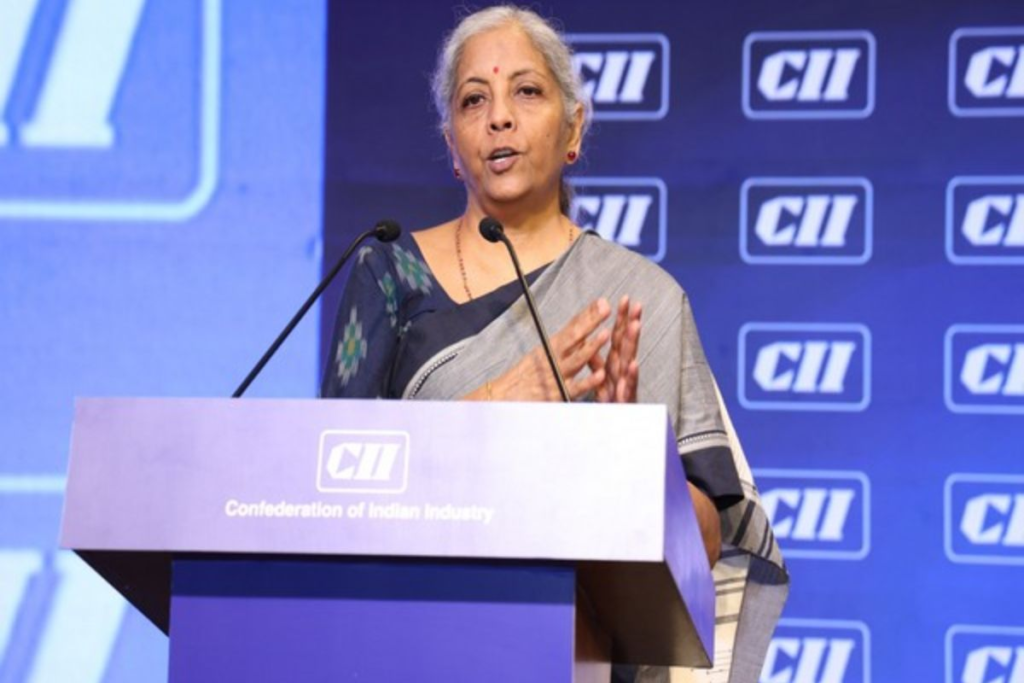Last Updated on May 18, 2024 1:51 am by INDIAN AWAAZ

AMN / WEB DESK
Finance Minister Nirmala Sitharaman stressed the need for India to boost its manufacturing sector to achieve self-reliance and increase its share in the global value chain. She highlighted the importance of policy support and sophistication in product manufacturing to attract investment and reduce dependence on China. The minister also discussed the success of the PLI scheme in sectors like telecom and electronics, showcasing India’s potential for growth and investment.
Speaking at the CII Annual Business Summit 2024 in New Delhi, the Finance Minister highlighted the importance of manufacturing alongside services and underscored the need for increased investment and governmental backing to strengthen this sector.
She also emphasised the role of the private sector as a “partner” to develop India.
“Much against the advice given by some economists that India should no longer be looking at manufacturing or ramping up manufacturing, I would like to highlight the fact that manufacturing must increase,” Sitharaman said.
“India must also increase, with the help of policies, its share in manufacturing in global value chains,” she said.
“So, we need to have greater sophistication in our product manufacturing. We also need to see how best this can be given policy support,” the minister added.
The Finance Minister further highlighted an IMF report saying that India’s contribution to global growth would be 18 per cent over the next five years, starting in 2023. She said that the period from 2023 to 2028 would be dynamic for India’s growth.
“IMF estimated that India’s contribution to global growth for five years, beginning 2023, will be 18 per cent. So between 2023 and 2028, we are looking at an India which will be dynamic, contributing 18 per cent to the global growth,” said the minister.
Sitharaman further quoted the S&P Global Market Intelligence outlook, which projects significant growth in India’s consumer market.
“The Indian consumer market is likely to double by 2031, there is a 2.9 trillion-dollar opportunity in that. The report also suggests that consumer spending on food in India is estimated to rise to 1.4 trillion US dollars; again, a one trillion-dollar opportunity lies in waiting,” the minister added.
She also highlighted the opportunities in India’s financial market, quoting the S&P report.
“Spending on financial services will climb to 670 billion US dollars, there is a 390 billion-dollar opportunity waiting for us. These are the opportunities that are untapped till now,” she said.
Speaking on job creation and the economic impact of green energy, the Finance Minister mentioned projections from the World Economic Forum.
She said the WEF projects 50 million net economy jobs are going to be created in India from green energy and 1 trillion economic impact by 2030. Solar energy has itself shown the extent to which job creation policy exists.
She further pointed out the government’s resolution of the twin balance sheet problem, where both banks and corporates were affected by rising NPAs and non-payment of dues.
“RBI and government survey report said from those twin balance sheet problems of 2013-14, today it is twin balance sheet advantage situation. So both corporate and financial sector balance sheets have not just turned around but are in pink to help,” said Sitharaman.
“The twin balance sheet advantage is there for both the opportunity and confidence element that this situation gives us,” she said.
